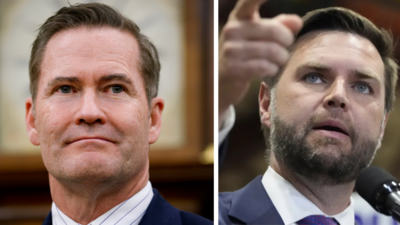From ‘Signalgate’ to the UN: Why Mike Waltz was ‘promoted’, not fired, according to US Vice President JD Vance; watch

Vice President JD Vance insists there’s no scandal behind Mike Waltz’s sudden exit as National Security Adviser, despite growing buzz around a Signal group chat gone wrong.
Speaking to Fox News, Vance said Waltz has the “trust of both myself and President Trump” and framed his nomination as US Ambassador to the United Nations as a strategic move, not a demotion.
“I think you could make a good argument that it’s a promotion,” Vance told Special Report. “We brought Mike on to do some serious reforms at the National Security Council. He has done that.”
Waltz, a former Florida congressman and Green Beret, joined the White House just four months ago—leaving his House seat to take the powerful NSA role. But controversy followed him quickly.
The Signal Chat incident
In late March, Waltz created a Signal group chat titled “Houthi PC small group” to coordinate discussions about pending strikes against Houthi targets in Yemen.
The chat included top Trump administration officials like Defense Secretary Pete Hegseth, DNI Tulsi Gabbard, CIA Director John Ratcliffe, and Vance himself. But it also, inadvertently, included an outsider: The Atlantic’s editor-in-chief Jeffrey Goldberg.
The mix-up meant a journalist had access to messages in which Hegseth shared sensitive—if not technically classified—information about the timing of U.S. military operations. Hegseth, a former Fox & Friends Weekend co-host, maintains nothing shared in the chat was classified.
Still, Democrats and defense officials expressed disbelief, arguing that operational details about targets and strikes would almost certainly qualify as classified. The Pentagon’s acting inspector general has since launched an investigation into Hegseth’s use of Signal for military coordination.
Vance downplays the fallout
Vance insists the incident, now dubbed “Signalgate”, had nothing to do with Waltz’s departure. He called the controversy a “nothingburger” and argued the move is about aligning talent to mission.
“This isn’t about a scandal,” Vance told anchor Bret Baier. “The president believes Waltz would do a better job in a different role.”
Even so, the messages in the Signal chat shed light on internal disagreements within the administration. Vance himself voiced concerns about the Yemen strikes, warning the team that the military action risked appearing inconsistent with Trump’s broader foreign policy message, especially the push for European allies to take more responsibility for their own defense.
“I am not sure the president is aware how inconsistent this is with his message on Europe right now,” Vance wrote in the group chat. “There’s a further risk that we see a moderate to severe spike in oil prices. I am willing to support the consensus of the team and keep these concerns to myself. But there is a strong argument for delaying this a month, doing the messaging work on why this matters, seeing where the economy is, etc.”
Vance later told Fox that the exchange reflects positively on his leadership style. “I think that’s what a good national security team should do,” he said, referring to open debate before decisive action.
Inside operation rough rider
The Yemen strikes are part of Operation Rough Rider, a US campaign now in its 40th day. According to CENTCOM, over 800 Houthi targets have been hit since the start of the operation. The strikes have killed hundreds of fighters and senior figures, including officials responsible for missile and drone operations.
Vance defended the campaign, saying it underscores Trump’s commitment to protecting U.S. shipping lanes and commercial interests.
“If you load stuff onto a ship and you send it to the United States,” Vance said, “we want to make sure it shows up without the sailors getting killed, without the ship being destroyed. And that is an objective that we’re going to pursue forcefully, if we have to.”
What’s next for Waltz?
Waltz’s nomination to the UN now heads to the Senate, where some lawmakers are expected to question him on the Signal incident and his role in the Yemen operation. But for now, the Trump administration is standing by him—arguing his reassignment is a strategic move, not a political casualty.





